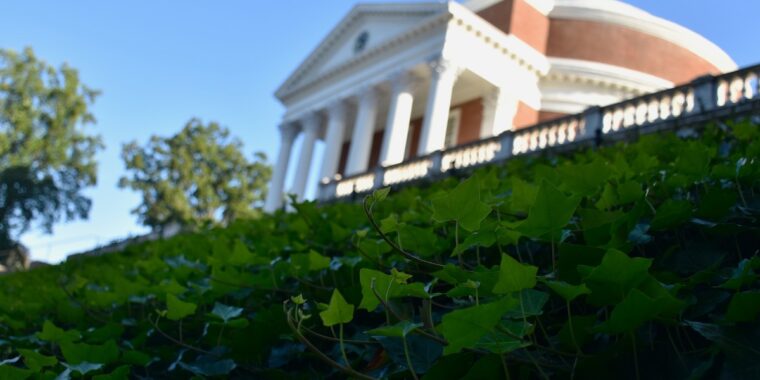
It’s no secret that the University of Virginia has trouble talking about tough subjects. Our Grounds, and colleges across the country, have been the subject of countless thinkpieces (including by our own students) covering any range of topics: the humiliating and counter-academic experience of self-censorship; the need for better dialogue; and the value of free and open inquiry as a part of learning. I suspect that my readers will immediately agree on the necessity of better disagreement: after all, the Independent’s mission is partly “to protect and encourage free speech.” And perhaps we have all had a time in class when we chose not to speak for fear that we would face the scorn of our peers.
But do you and I agree on why this is?
In the time that I’ve been engaged with the community of discourse-minded students at UVA, I’ve become keenly aware that, despite our very similar sounding names—I founded UVA’s Civil Discourse Initiative, which is different from the Constructive Dialogue Institute, which is separate from the National Institute for Civil Discourse—we have a wide range of values and goals.
Take for example the relatively popular nationwide organization Heterodox Academy, which supports academic open inquiry with editorials, conferences, financial support, and community-building, and of which I am a member. While I admire the group’s conviction to sitting with hard subjects, many of its members would rather sit with one: diversity, equity, and inclusion (DEI). On member forums, post after post claims to debunk DEI programs or target vocal professors in African American Studies and related fields. Indeed, the Academy will host a conference later this month on the role of diversity in Canadian colleges.
Another example lives closer to home: the Jefferson Council publishes article after article excoriating the fact that the University would dare invest in diversity efforts. The Council is also responsible for such ‘free-speech’ events as Mike Pence’s “Save America from the Woke Left.” Countless other assemblages of wealthy alumni, interested parties, and retired professors across the country claim to represent freedom of inquiry while themselves choosing to advocate for only one side on only one issue. And it is their money, their words, which lie behind the moniker of “free speech” on Grounds.
Meanwhile, the disease of silent disagreement continues to spread like wildfire at UVA. Exacerbated by deeply emotional issues like the ongoing violence in Gaza, a nationwide struggle for abortion rights, and the upcoming 2024 election, students have chosen simply to avoid stating their views on anything—either until they can defend their words against critics and against time, or simply until the issue goes away. Dialogue itself has become a tough subject, with conflicting opinions in the field on whether President Ryan ought to put the University’s name on particular ideologies favored by some students. For many, “free speech” has a bad name—it’s tied to too many efforts beyond our control that would simply rather we think something different.
But at the same time, we cannot accept that the ideal of good dialogue will wither on the vine of the culture war while people suffer and our government freezes. We cannot accept that UVA’s students, who will one day join the leaders of the world’s institutions, will see politics as a fraud which benefits no one. We cannot accept that, at this moment where we need to talk the most, students resort most often to silence.
How do we get students to believe in politics again? How do we convince people that disputes will be resolved not by centrism and petty compromise, but by doing the hard work of sitting with disagreement? As a professor I know once put it, how do we turn “safe spaces” into “brave spaces”? These are the questions we as a student body must answer if we are to overcome the challenges facing the University.
It would be so easy to propose that we begin, quite simply, by talking to each other—that we should put on our battle gear and venture into the field ready to fight for our ideas. But this, too, comes with problems. We know that Americans don’t trust each other to have civil conversations, cast informed votes, or respect others’ rights. And what about the fact that so many of the most controversial issues today are deeply tied to identities, historical harms, and rights? There is so much work to do in preparing people to engage in tough issues without making the same mistakes which got us here in the first place. And the environment which created our fierce mistrust will make that work harder, too.
I am so amazed at the wealth of efforts to prepare the way for discourse on Grounds—a thousand flowers are blooming which could solve the problem and allow us to approach our issues with understanding in mind. One of them is my own: I began work on a project last semester called the Civil Discourse Initiative, which will soon start hosting speaker events that challenge our conceptions of what it means to disagree and what it means to be a partisan. Just as important to that wealth are UVA’s many debate societies, such CIOs as Middle Grounds and Hoos Views, and the many institutional efforts that provide crucial funding, support, and programming to the mission.
Together, we can give ‘free speech’ a good name. We must be vigilant against people who co-opt good dialogue and spin it for their own ideological purposes. We must prepare the way for people to talk—not just by starting conversations but by learning what it means to talk better. And we must resolve ourselves not to let democracy die in silence.
The opinions expressed within this piece represent the views of the author alone and do not necessarily reflect the views of The Jefferson Independent.


Leave a Reply